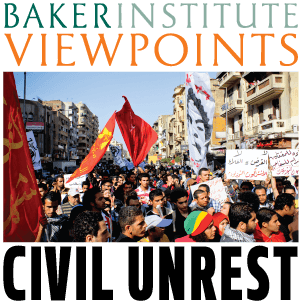In light of the radical changes in the Middle East and North Africa following the Arab Spring, civil unrest has become an issue of utmost concern for policymakers, analysts and academics. Nowhere can the implications of ignored or improperly addressed public discontent be seen more clearly than in Syria’s brutal and potentially regionally destabilizing civil war. Widespread protests are also disrupting — and even overturning — the status quo in Brazil, Turkey and Egypt. In the third of a seven-part Baker Institute Viewpoints series, we evaluate the impact that this new wave of civil unrest will have on international politics. In the coming days, institute experts will address the effects on U.S. foreign policy, unexpectedly stable regimes, analytical tools for understanding civil unrest and political philosophical conceptions of “just” societies.
Read other posts in this series:
- Turkey, Brazil and Egypt: The stakes for the United States by Joe Barnes, Bonner Means Baker Fellow
- Egypt and the Gulf: The illusion of stability?, by Kristian Coates Ulrichsen, fellow for Kuwait
- What civil unrest in Brazil portends for the international system by Nathan Jones, postdoctoral fellow in drug policy
- Civil unrest: Is Mexico next? by Tony Payan, fellow in Mexico studies
- A new wave of democracy in Turkey by Dina Shahrokhi, research associate for the Middle East
- Egypt after the coup: Only the beginning of the beginning by Albert B. Wolf, doctoral candidate at the University of California, Irvine
Turkey, Brazil, then Egypt: Once again, discontent has led to major popular protest — and, in the case of Egypt, the removal of a democratically elected leader and replacement by a military-backed interim government. And just as before, the Internet and social media have served as a facilitator of these movements. Back in 2011, these same technologies were at the heart of organizing popular protests by middle-class activists (including women) who possessed the right combination of education and ambition to question the authority of their secular leaders in Tunisia, Egypt, Libya and Syria.
Since 2011, leaders have learned to use technology to their own advantage. Iran’s election this year was a quiet event, in part due to the government’s ability to censor the use of the Internet within the country’s borders. Syria has gone on the offensive, employing its own hacker organization, the Syrian Electronic Army, to undermine the communications of the opposition Free Syrian Army. Dictators are not the only leaders who have studied up on Internet monitoring and censorship: Pakistan’s democratically elected government continues to employ technology by Canadian firm Netsweeper, which filters Web content relating to human rights, sensitive religious topics and independent media.
This brings us to the other big news item of the summer: the Snowden affair. Still stuck at Sheremetyevo, NSA leaker Edward Snowden has forced the American public and allies abroad to confront the reality that the social media so ably employed by the revolutionaries in Tunis and Cairo also is likely monitored to some degree by the U.S. government. While this collection was designed to thwart terrorism, it should cause concern among people utilizing cloud-based data services. Where are the servers with your Facebook pictures or your Google documents? Whose laws and regulations apply to them? What information qualifies as being pertinent to national security? These are all important questions.
It is interesting that the technologies used to mobilize the public against regimes in the Middle East, not to mention the Occupy movement here in the United States and elsewhere, are the very same ones likely to be under surveillance or censorship as well. Leaders are recognizing that movements in the cyber realm can lead to tangible consequences in the real world. Turkish Prime Minister Recep Tayyip Erdogan noted, “There is now a menace which is called Twitter. […] The best examples of lies can be found there. To me, social media is the worst menace to society.”
The summer’s events should provide some lessons. First, the wave of globalization we have witnessed was largely a product of the Internet. Second, there are now grand politics of cyberspace too important for leaders to ignore. And finally, there will be a mighty struggle between states, corporations, the discontented and that catch-all group of civil society that will largely take place online — at least until the crowds form and the tear gas flies.
The Internet is a wonderful and powerful creation, but its spread to billions across the planet has been faster than the proliferation of any other technology. The printing press broke the Catholic monopoly over European souls in the Renaissance; cyberspace will probably produce similarly profound effects.
 Christopher Bronk is the Baker Institute fellow in information technology policy. He previously served as a career diplomat with the U.S. Department of State on assignments in Mexico, overseas and Washington, D.C. Follow him on Twitter at @techpologist.
Christopher Bronk is the Baker Institute fellow in information technology policy. He previously served as a career diplomat with the U.S. Department of State on assignments in Mexico, overseas and Washington, D.C. Follow him on Twitter at @techpologist.
